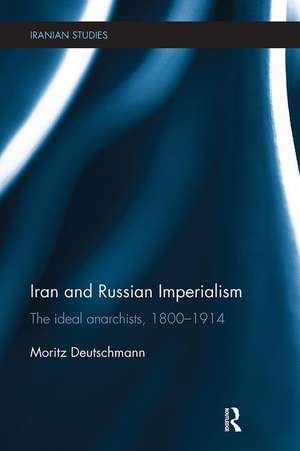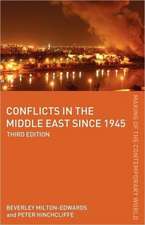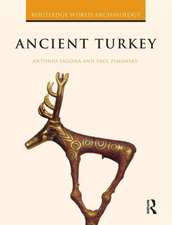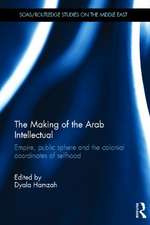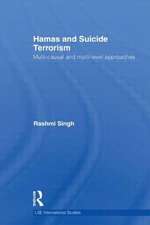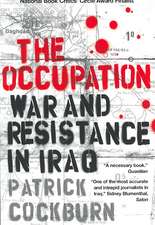Iran and Russian Imperialism: The Ideal Anarchists, 1800-1914: Iranian Studies
Autor Moritz Deutschmannen Limba Engleză Paperback – 24 ian 2018
Iran and Russian Imperialism develops a comprehensive picture of Russia’s historical entanglements with one of its most important neighbours in Asia. It recounts how the Russian Empire strived to gain political influence at the Persian court, promote Russian trade, and secure the enormous southern borders of the empire. Using hitherto often neglected documents from archives in Russia and Georgia and reading them against the grain, this book reveals the complex reactions of different groups in Iranian society to Russian imperialism. As it turns out, the Iranians were, in the words of the Russian orientalist Konstantin Smirnov, "ideal anarchists," whose resistance to imperial domination, as well as to centralized state institutions more generally, impacted developments in the region in the century to come.
Iran’s troubled relationship with the wider world continues to be a topic of considerable interest to historians, yet little focus has been given to Russia’s historical connections to Iran. This book thus represents a valuable contribution to Iranian and Russian History, as well as International Relations.
| Toate formatele și edițiile | Preț | Express |
|---|---|---|
| Paperback (1) | 449.41 lei 43-57 zile | |
| Taylor & Francis – 24 ian 2018 | 449.41 lei 43-57 zile | |
| Hardback (1) | 1054.71 lei 43-57 zile | |
| Taylor & Francis – 14 dec 2015 | 1054.71 lei 43-57 zile |
Din seria Iranian Studies
-
 Preț: 154.25 lei
Preț: 154.25 lei -
 Preț: 309.99 lei
Preț: 309.99 lei - 18%
 Preț: 1053.92 lei
Preț: 1053.92 lei - 18%
 Preț: 1108.37 lei
Preț: 1108.37 lei - 25%
 Preț: 823.63 lei
Preț: 823.63 lei - 25%
 Preț: 823.99 lei
Preț: 823.99 lei -
 Preț: 440.77 lei
Preț: 440.77 lei - 18%
 Preț: 1068.18 lei
Preț: 1068.18 lei - 18%
 Preț: 997.90 lei
Preț: 997.90 lei -
 Preț: 389.38 lei
Preț: 389.38 lei - 18%
 Preț: 1055.51 lei
Preț: 1055.51 lei - 14%
 Preț: 299.52 lei
Preț: 299.52 lei -
 Preț: 442.88 lei
Preț: 442.88 lei - 18%
 Preț: 1059.84 lei
Preț: 1059.84 lei - 26%
 Preț: 848.57 lei
Preț: 848.57 lei - 25%
 Preț: 770.09 lei
Preț: 770.09 lei -
 Preț: 341.55 lei
Preț: 341.55 lei - 18%
 Preț: 1163.51 lei
Preț: 1163.51 lei -
 Preț: 437.13 lei
Preț: 437.13 lei - 18%
 Preț: 1168.76 lei
Preț: 1168.76 lei -
 Preț: 436.14 lei
Preț: 436.14 lei - 18%
 Preț: 1110.77 lei
Preț: 1110.77 lei -
 Preț: 478.86 lei
Preț: 478.86 lei - 25%
 Preț: 570.60 lei
Preț: 570.60 lei - 18%
 Preț: 1114.70 lei
Preț: 1114.70 lei - 26%
 Preț: 822.01 lei
Preț: 822.01 lei - 18%
 Preț: 1000.27 lei
Preț: 1000.27 lei - 18%
 Preț: 1060.52 lei
Preț: 1060.52 lei -
 Preț: 409.31 lei
Preț: 409.31 lei - 18%
 Preț: 1054.71 lei
Preț: 1054.71 lei - 22%
 Preț: 328.20 lei
Preț: 328.20 lei -
 Preț: 430.94 lei
Preț: 430.94 lei - 18%
 Preț: 1055.51 lei
Preț: 1055.51 lei - 18%
 Preț: 1002.63 lei
Preț: 1002.63 lei - 31%
 Preț: 683.99 lei
Preț: 683.99 lei - 18%
 Preț: 1061.06 lei
Preț: 1061.06 lei - 18%
 Preț: 1118.65 lei
Preț: 1118.65 lei - 18%
 Preț: 1054.75 lei
Preț: 1054.75 lei
Preț: 449.41 lei
Nou
Puncte Express: 674
Preț estimativ în valută:
85.99€ • 90.03$ • 71.15£
85.99€ • 90.03$ • 71.15£
Carte tipărită la comandă
Livrare economică 07-21 aprilie
Preluare comenzi: 021 569.72.76
Specificații
ISBN-13: 9781138495470
ISBN-10: 1138495476
Pagini: 236
Ilustrații: 2 Line drawings, black and white; 7 Halftones, black and white; 9 Illustrations, black and white
Dimensiuni: 156 x 234 x 21 mm
Greutate: 0.45 kg
Ediția:1
Editura: Taylor & Francis
Colecția Routledge
Seria Iranian Studies
Locul publicării:Oxford, United Kingdom
ISBN-10: 1138495476
Pagini: 236
Ilustrații: 2 Line drawings, black and white; 7 Halftones, black and white; 9 Illustrations, black and white
Dimensiuni: 156 x 234 x 21 mm
Greutate: 0.45 kg
Ediția:1
Editura: Taylor & Francis
Colecția Routledge
Seria Iranian Studies
Locul publicării:Oxford, United Kingdom
Public țintă
Postgraduate and UndergraduateCuprins
Introduction Part I. The Russian Empire and Qajar Society, 1800s–1870s 1. Shahs and Tsars 2. Merchants and Consuls 3. Nomads and Borders Part II. The Micropolitics of Imperialism, 1880s–1905 4. Imperial Intrusion and Autocratic Rule 5. Economic Imperialism and Urban Politics in Tabriz 6. Between International Borders and Colonial Frontiers Part III. Russia’s Iranian Revolution, 1905–1913 7. The Iranian Monarchy and the Constitutional Revolution 8. Tabriz under Siege 9. Tribal Power and its Transformation IV. Conclusion
Recenzii
"Deutschmann examines Russo-Iranian relations from the wars of the early 19th century that resulted in the Russian annexation of Transcaucasia—what is today Georgia, Armenia, and Azerbaijan—through WW II. The author is critical of the “Great Game” approach, which he suggests confuses Russo-British rivalry in the region with the actual exercise of power on the ground and takes for granted Russian and British power, even “mastery,” in a region where the reality was far more complex. Instead, he argues, Russia’s historical role in Iran was shaped more by longstanding relations between the Romanov and Qajar dynasties, merchant networks, and the entanglement of both empires in the complex tribal politics of the region. Political power in 19th-century Iran, Deutschmann explains, rested on a “delicate balance between tribal groups, urban merchant communities, and a monarchy whose use of grandiloquent titles—for example, the 'pivot of the universe,' contrasted with its factual powerlessness.” “Persian anarchy” was a challenge for the Russian Empire, whose officials worked with the Qajar state on issues of trade and border establishment, seeking to shore up Qajar rule and shaping it by both diplomatic pressure and example.
Summing Up: Recommended. Graduate students, faculty."
M. A. Soderstrom, Aurora University - CHOICE
"The book is well researched, clearly organized, and convincingly argued, making for enlightening and pleasant reading... The format of the book is reader-friendly: the narrative is accompanied by several maps and illustrations; each chapter is followed by endnotes and a bibliography... This excellent book leaves the reader wishing that the author would expand his research beyond the year 1913—until at least 1917—and address the relationship between the Russians and the Shi’a ulama in Iran."
Elena Andreeva, Virginia Military Institute, The Russian Review
"Deutschmann examines Russo-Iranian relations from the wars of the early 19th century that resulted in the Russian annexation of Transcaucasia—what is today Georgia, Armenia, and Azerbaijan—through WW II. The author is critical of the “Great Game” approach, which he suggests confuses Russo-British rivalry in the region with the actual exercise of power on the ground and takes for granted Russian and British power, even “mastery,” in a region where the reality was far more complex. Instead, he argues, Russia’s historical role in Iran was shaped more by longstanding relations between the Romanov and Qajar dynasties, merchant networks, and the entanglement of both empires in the complex tribal politics of the region. Political power in 19th-century Iran, Deutschmann explains, rested on a “delicate balance between tribal groups, urban merchant communities, and a monarchy whose use of grandiloquent titles—for example, the 'pivot of the universe,' contrasted with its factual powerlessness.” “Persian anarchy” was a challenge for the Russian Empire, whose officials worked with the Qajar state on issues of trade and border establishment, seeking to shore up Qajar rule and shaping it by both diplomatic pressure and example.
Summing Up: Recommended. Graduate students, faculty."
M. A. Soderstrom, Aurora University - CHOICE
Summing Up: Recommended. Graduate students, faculty."
M. A. Soderstrom, Aurora University - CHOICE
"The book is well researched, clearly organized, and convincingly argued, making for enlightening and pleasant reading... The format of the book is reader-friendly: the narrative is accompanied by several maps and illustrations; each chapter is followed by endnotes and a bibliography... This excellent book leaves the reader wishing that the author would expand his research beyond the year 1913—until at least 1917—and address the relationship between the Russians and the Shi’a ulama in Iran."
Elena Andreeva, Virginia Military Institute, The Russian Review
"Deutschmann examines Russo-Iranian relations from the wars of the early 19th century that resulted in the Russian annexation of Transcaucasia—what is today Georgia, Armenia, and Azerbaijan—through WW II. The author is critical of the “Great Game” approach, which he suggests confuses Russo-British rivalry in the region with the actual exercise of power on the ground and takes for granted Russian and British power, even “mastery,” in a region where the reality was far more complex. Instead, he argues, Russia’s historical role in Iran was shaped more by longstanding relations between the Romanov and Qajar dynasties, merchant networks, and the entanglement of both empires in the complex tribal politics of the region. Political power in 19th-century Iran, Deutschmann explains, rested on a “delicate balance between tribal groups, urban merchant communities, and a monarchy whose use of grandiloquent titles—for example, the 'pivot of the universe,' contrasted with its factual powerlessness.” “Persian anarchy” was a challenge for the Russian Empire, whose officials worked with the Qajar state on issues of trade and border establishment, seeking to shore up Qajar rule and shaping it by both diplomatic pressure and example.
Summing Up: Recommended. Graduate students, faculty."
M. A. Soderstrom, Aurora University - CHOICE
Descriere
Iran and Russian Imperialism develops a comprehensive picture of Russia’s historical entanglements with one of its most important neighbours in Asia. It recounts how the Russian Empire strived to gain political influence at the Persian court, promote Russian trade, and secure the enormous southern borders of the empire. Using hitherto often neglected documents from archives in Russia and Georgia and reading them against the grain, this book reveals the complex reactions of different groups in Iranian society to Russian imperialism. As it turns out, the Iranians were, in the words of the Russian orientalist Konstantin Smirnov, "ideal anarchists," whose resistance to imperial domination, as well as to centralized state institutions more generally, impacted developments in the region in the century to come.
